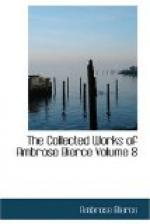My incumbency of the Chair of Cats in the Graymaulkin University had not, of course, been marked by any instance of mean industry. There had never, at any one time, been more than two students of the Noble Science, and by merely repeating the manuscript lectures of my predecessor, which I had found among his effects (he died at sea on his way to Malta) I could sufficiently sate their famine for knowledge without really earning even the distinction which served in place of salary.
Naturally, under the straitened circumstances, I regarded Elizabeth Mary as a kind of special Providence. She unwisely refused to share her fortune with me, but for that I cared nothing; for, although by the laws of that country (as is well known) a wife has control of her separate property during her life, it passes to the husband at her death; nor can she dispose of it otherwise by will. The mortality among wives is considerable, but not excessive.
Having married Elizabeth Mary and, as it were, ennobled her by making her a Turmore, I felt that the manner of her death ought, in some sense, to match her social distinction. If I should remove her by any of the ordinary marital methods I should incur a just reproach, as one destitute of a proper family pride. Yet I could not hit upon a suitable plan.
In this emergency I decided to consult the Turmore archives, a priceless collection of documents, comprising the records of the family from the time of its founder in the seventh century of our era. I knew that among these sacred muniments I should find detailed accounts of all the principal murders committed by my sainted ancestors for forty generations. From that mass of papers I could hardly fail to derive the most valuable suggestions.
The collection contained also most interesting relics. There were patents of nobility granted to my forefathers for daring and ingenious removals of pretenders to thrones, or occupants of them; stars, crosses and other decorations attesting services of the most secret and unmentionable character; miscellaneous gifts from the world’s greatest conspirators, representing an intrinsic money value beyond computation. There were robes, jewels, swords of honor, and every kind of “testimonials of esteem”; a king’s skull fashioned into a wine cup; the title deeds to vast estates, long alienated by confiscation, sale, or abandonment; an illuminated breviary that had belonged to Sir Aldebaran Turmore de Peters-Turmore of accursed memory; embalmed ears of several of the family’s most renowned enemies; the small intestine of a certain unworthy Italian statesman inimical to Turmores, which, twisted into a jumping rope, had served the youth of six kindred generations—mementoes and souvenirs precious beyond the appraisals of imagination, but by the sacred mandates of tradition and sentiment forever inalienable by sale or gift.
As the head of the family, I was custodian of all these priceless heirlooms, and for their safe keeping had constructed in the basement of my dwelling a strong-room of massive masonry, whose solid stone walls and single iron door could defy alike the earthquake’s shock, the tireless assaults of Time, and Cupidity’s unholy hand.




